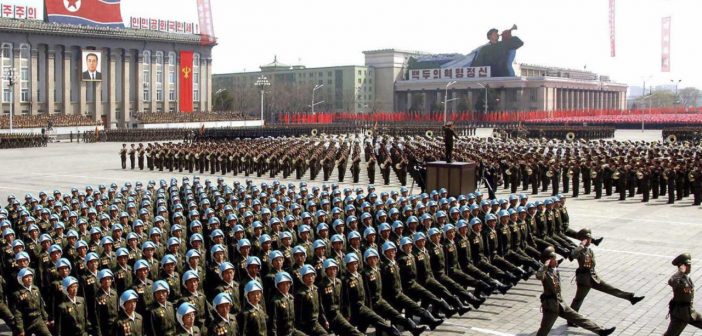During the presidential campaign, Donald Trump boasted that he would meet North Korea’s Kim Jong Un to resolve the nuclear crisis that now has the world on edge.
As US president, however, Trump has been less diplomatic, incessantly threatening military action against North Korea and belittling Kim as “Little Rocket Man.”
Trump believes saber-rattling and targeted economic moves will drive China to pressure the North and intimidate the Pyongyang into backing down.
Underscoring his tough-guy disdain for dialogue, Trump over the weekend took the extraordinary step of criticizing his chief diplomat, Secretary of State Rex Tillerson, for trying to talk to North Korea to defuse tensions, calling it a waste of time and, again, hinting at military action.
But Trump’s rhetoric is increasingly seen as incredible, undermining his own administration’s positive steps to check North Korea and scaring America’s allies more than Kim, a hard man who has wielded brutal power, including executing his own family members.
Tensions soared last month after the North’s sixth and most powerful underground nuclear test. Trump and Kim have since exchanged escalating threats and invective that veteran analysts said raised the chance of conflict to 50 percent. That’s too high a risk when dealing with a deeply paranoid, nuclear-armed and homicidal regime with a penchant for extravagant acts of extreme violence. If convinced that he faces an existential threat, Kim may decide that, with nothing to lose, going down in a blaze of glory is the only option.
Bluffing may work in poker and real estate, but not when dealing with the most dangerous country in the world. And history has taught that escalating rhetoric by inexperienced or misguided leaders has unintended consequences.
Outrageous rhetoric from Kim is the norm. That America’s president has stooped to the same level with personal invective that his advisors urged him to avoid as dangerously provocative makes the most powerful man in the world sound like a schoolyard bully.
America’s unique role as the world’s indispensable power to shape events depends on its credibility. But the world is increasingly questioning Trump and America’s credibility. French President Emmanuel Macron recently observed that Trump rarely means what he says and often backs himself into irreversible rhetorical corners.
In terms of conventional forces, neither the United States nor South Korea have appreciably changed their regional military posture – which would be a prelude to either preemptive action or beefed-up defenses – and Pyongyang knows it.
In fact, DoD started working new military options only a few weeks ago and finding its range of action limited, with each — whether returning US tactical nuclear weapons to the peninsula or naval blockades — fraught with risk.
If either conventional or nuclear war does break out, North Korea would ultimately lose, but at enormous cost. Seoul, home to 25 million people, is 30 miles from the border, and within reach of the North’s powerful conventional rocket and artillery arsenal. Casualties would be higher in the event of nuclear exchange, with the fallout likely to end up over South Korea and Japan — the only nation to have suffered two nuclear attacks.
The other key to credibility is avoiding absurd statements. The State Department yesterday said North Korea would not be allowed to attain a nuclear capability, a ludicrous claim given that Pyongyang has nukes and developing rockets able to deliver them to America’s shores.
So, what to do?
First, Trump must stop the fiery rhetoric that plays well to his base but undermines American credibility at the very time when credibility is needed. It’s imperative to avoid unnecessarily escalating tensions. For example, after Trump boasted that UN sanctions silenced Kim, Pyongyang launched missiles over Japan. America’s power is increased when it chooses its words carefully and demonstrates its resolve when it matches its actions with those carefully chosen words. That coupling of rhetoric and action in military terms is what gives US diplomacy its credibility. And this is a time for deft diplomacy that involves precise, unambiguous language.
Second, it’s time to acknowledge North Korea as a nuclear state that is unlikely to relinquish either its nuclear weapons or ballistic missiles anytime soon. There is nothing new in that. Russia and China have threatened the United States and its allies for decades. Strategic nuclear deterrence has worked since 1945, and against North Korea since 2006. It can work equally well into the future.
Third, it’s important to talk to North Korea – either directly or multinationally – and understand what it wants. Now, that’s not going to be easy. Eight international agreements have failed along with multiparty talks, and President Obama’s open hand was rejected along with other US efforts to make contact. The “New York channel” was opened only to secure the release of Otto Warmbier. North Korea also never answers the hotline. But leadership is about doing the right thing even if your adversary doesn’t. And part of talking is the signals you’re sending. Time and again, Washington – whether in Vietnam, Iraq, Afghanistan or, now, North Korea – messages as if it’s talking to Americans rather than nations with very different world views. Messaging that works on other Westerners will not work against a totalitarian dictator.
The notion that Kim is suicidal is misguided. Staying in power is the Kim family business. He is ruthless at home and needs external threats to maintain national unity. His nuclear weapons are about staying in power. He saw that when Libya gave up its nuclear program, its leader was deposed and brutally killed by an angry mob. He knows that an attack on the United States will elicit a massive response that will not only end his regime, but his nation. His goal is to act violently enough – or develop unambiguously impressive capabilities – to be regarded as both credible and dangerous without tipping the region into war.
Dialogue can help Washington and its allies build a long-term strategy of containment, or compel and convince Pyongyang to change course. Success there will take strategy, many years of hard work, more targeted sanctions and thoughtful incentives. Throughout the Cold War, Washington talked regularly to the Soviet Union to prevent crises from spiraling out of control. A hotline with Pyongyang may be a good way to build a rapport that does not now exist.
Fourth, implement new economic sanctions and enforce those already adopted. On this score, Trump deserves enormous credit, crafting tough new sanctions that have targeted financial institutions and people, and more forcefully enforcing sanctions already on the books. The US has also managed to get them approved by the UN Security Council.
More must be done to exact pain on any organization that is directly or indirectly supporting Pyongyang’s nuclear and missile capabilities, whether they are Russian, European or Chinese. These sanctions are key to compelling Beijing and others to apply more pressure on Pyongyang.
The new economic moves targeted against Chinese institutions from engaging in US-dollar-based trade deeply worries Beijing. In September 2005, the Bush administration sanctioned Banco Delta Asia, one of Macau’s leading banks that laundered North Korean assets, from doing business in US dollars, ensnaring key Chinese accounts in the process.
Fifth, America can’t afford to outsource its North Korea strategy. After taking office, Trump tried to hand the North Korea problem to China, a problem that Beijing over decades has enabled rather than helped resolve. While China has less influence with the North than we would like, it has more sway than they claim. For years, Beijing has allowed goods, people and financial assets to flow in and out of the North.
Beijing says it worries that, if North Korea collapses, it will have a failed state on its border. And should it unify with the South, American troops will be right on its border. That’s true, but by failing to address the North Korean threat, nations across Asia are growing closer to the United States. It’s in China’s global strategic interests as a rising superpower to help resolve the crisis and curb the North.
Washington must be very careful, as China will exact a high price for its role in resolving this threat – especially with regard to its South China Sea claims. This situation must be resolved without accepting any of Beijing’s outlandish territorial claims.
Sixth, the United States must boost military support for South Korea, including more air-defense systems. What Seoul doesn’t need are tactical nuclear weapons, which would only escalate the situation. They are unnecessary – US strategic missiles have defended the nation for two decades.
Finally, the administration must be weary of an emerging China-Russia axis that will seek to exploit this situation to ensure that a painful and distracting thorn remains in the side of the United States and its friends in the region. Consider that Russia decided now’s the time to pressure Japan and conflicting island claims and is coming to North Korea’s defense, suggested no additional UN Security Council action is needed. On this score, Trump’s “sovereignty” rhetoric is to Beijing and Moscow’s liking, as each is as eager as the new American president to upend the international order – crafted by the United States and its friends – that has kept the peace since World War II.
North Korea is a problem that has developed over decades. There are no quick fixes nor hard enough talk that will miraculously make Pyongyang heel. The country is more dangerous now that it’s ever been. Now is not the time to be reckless, but to work methodically and patiently to deescalate and resolve one of the world’s most dangerous problems.




